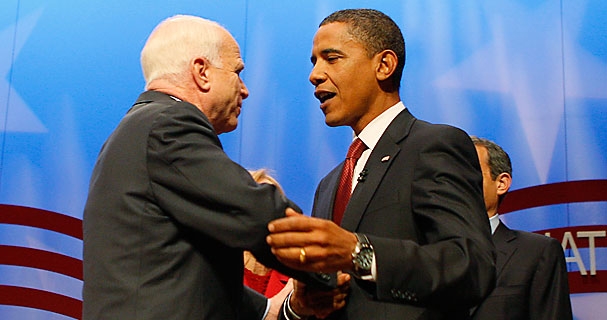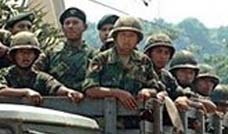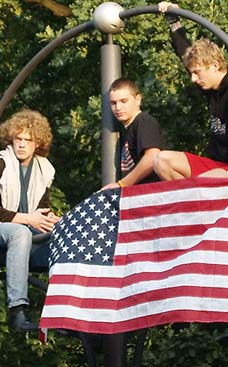
At first blush, the two candidates appear indistinguishable on the subject. Both have urged Americans to look beyond their individual, material pursuits and commit themselves to causes greater than themselves -- Sen. McCain arguably even more aggressively than Mr. Obama. The difference is that for Mr. McCain this is a moral ideal. For Mr. Obama, it is a governing mission. "Making that call to service will be a central cause of my presidency," he declared in an Independence Day address at the University of Colorado and elsewhere. Mr. McCain certainly uses his bully pulpit to proselytize Americans about public service. But he more or less stops there, even repeatedly cautioning during the Columbia forum against federalizing public service, although that doesn't mean that he wouldn't throw taxpayer money at some of his pet service projects. However, his Web site offers nothing near what Mr. Obama is proposing. Mr. Obama has laid out a 10-page vision statement that includes virtually every program proposed by the left and the right in recent memory and then some. President Bush's controversial faith-based initiative? He'll keep it. President Kennedy's Peace Corps? He'll double it. Even Mr. McCain's seven-year-old plan to raise a domestic civilian force to fight terrorism and triple enrollment in AmeriCorps gets a plug.
Comparing Obama and McCain On Public Service
Comparing Obama and McCain On Public Service
By SHIKHA DALMIA
September 15, 2008; Page A23
Caption: GOP presidential candidate John McCain (left) greets his Democratic opponent, Barack Obama, at a forum on national service at Columbia University on Sept. 11. Photo: Stephan Savoia/AP
Both John McCain and Barack Obama exhorted Americans to dedicate themselves to public service in an appearance at Columbia University on Thursday, to mark the seventh anniversary of 9/11. But Americans need no lectures from politicians to participate in their nation's civic life. They need them to stay out of the way. Between the two, Sen. Obama is far less likely to do so.
At first blush, the two candidates appear indistinguishable on the subject. Both have urged Americans to look beyond their individual, material pursuits and commit themselves to causes greater than themselves -- Sen. McCain arguably even more aggressively than Mr. Obama. The difference is that for Mr. McCain this is a moral ideal. For Mr. Obama, it is a governing mission. "Making that call to service will be a central cause of my presidency," he declared in an Independence Day address at the University of Colorado and elsewhere.
Mr. McCain certainly uses his bully pulpit to proselytize Americans about public service. But he more or less stops there, even repeatedly cautioning during the Columbia forum against federalizing public service, although that doesn't mean that he wouldn't throw taxpayer money at some of his pet service projects. However, his Web site offers nothing near what Mr. Obama is proposing.
Mr. Obama has laid out a 10-page vision statement that includes virtually every program proposed by the left and the right in recent memory and then some. President Bush's controversial faith-based initiative? He'll keep it. President Kennedy's Peace Corps? He'll double it. Even Mr. McCain's seven-year-old plan to raise a domestic civilian force to fight terrorism and triple enrollment in AmeriCorps gets a plug.
In addition, Mr. Obama would create several new corps of his own: a Classroom Corps to help teachers and students in underperforming schools; a Health Corps for underserved areas; a Clean Energy Corps to weatherize homes and promote energy independence. The last is separate from his Global Energy Corps, to promote low-carbon energy solutions in developing countries.
Mr. Obama calls all this his "Plan for Universal and Voluntary Citizen Service." It might live up to its "universal" billing, given that it would prod Americans of all age groups -- from preteens to retirees -- to sign up. But as to its voluntariness, the plan will make generous use of Uncle Sam's money -- and muscle.
By Mr. Obama's account, he will make federal education aid conditional on schools requiring that high-school and even middle-school students perform 50 hours of service each year. He will also offer college students $4,000 every year for doing 100 hours of public service. That works out to $40 an hour -- a deal that only the very wealthy could refuse. (The Obama campaign puts the price tag for this alone at $10 billion.) He promises to provide older Americans who perform civic service with "additional income security, including assistance with retirement and family-related costs, and continuation of health-care coverage." But a government that links benefits to service can take away benefits for nonservice.
The real issue is why Mr. Obama thinks it is necessary to take such extraordinary steps to push all Americans into service. Americans every year contribute close to $300 billion out of their own pockets to charities at home and abroad. This is the highest of any nation -- seven times more than Germans and 14 times more than Italians per capita. Americans are equally generous with their time. According to the Corporation for National and Community Service -- a federal agency -- last year Americans volunteered 8.1 billion hours of service valued at $150 billion to community organizations.
Mr. Obama doesn't think this kind of voluntary effort is sufficient, because it can't deliver social justice. In his memoirs and elsewhere, he distinguishes between community service and organization. Community service, he believes, can offer short-term relief to those temporarily down-and-out, through things like church food pantries or homeless shelters. It can also address concrete problems such as vandalism or crime through neighborhood watches.
However, Mr. Obama believes -- as he wrote in a 1990 anthology, "After Alinsky: Community Organizing in Illinois" -- that this kind of service plays into the "individualistic bootstrap myth." It doesn't by itself help the disenfranchised trapped in inner cities.
For that, Mr. Obama wants collective political action, i.e., bottom-up mobilization, to help the disaffected extract resources from the powers-that-be to remake their communities. This is what Mr. Obama attempted to do during his years as a community organizer. And that's what he hopes all his cadres of social workers would also do.
Mr. Obama's moral vision presupposes that the key to individual advancement is securing a larger share of a fixed social pie from those who control it. This posture, relevant in premodern patronage systems, is profoundly at odds with the modern, market economy in which individuals don't have to wrest resources from others to prosper; they have opportunities to create their own. That requires a morality of independence and self-reliance -- precisely what Mr. Obama downplays with his comments about the "individualistic bootstrap myth."
Bolstering this morality is a complex task that will involve addressing social policies that have contributed to the breakdown of families, sapping crucial psychological resources from inner-city communities -- as Mr. Obama himself has acknowledged on occasion. It won't be accomplished by deploying federally funded armies of self-righteousness.
In his first memoir, "Dreams from My Father," Mr. Obama tells how he mobilized residents of a housing project to get the Chicago Housing Authority to clean up asbestos in their walls. The agency did, then ran out of funds for even more pressing problems like repairing leaky roofs, leaving residents even worse off.
Mr. Obama's take-away: more activism for more funds. One fellow activist, a diminutive, married woman, demurred. "Ain't nothing going to change, Mr. Obama," she told him. "We just gonna concentrate on saving our money so we can move outta here as fast as we can."
She is the one who learned the right lesson.
Ms. Dalmia is a senior analyst at Reason Foundation.












